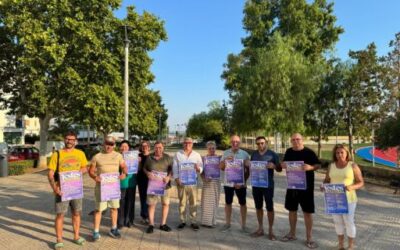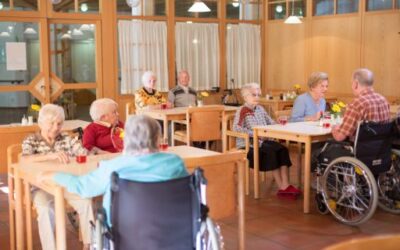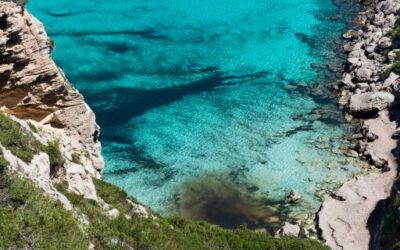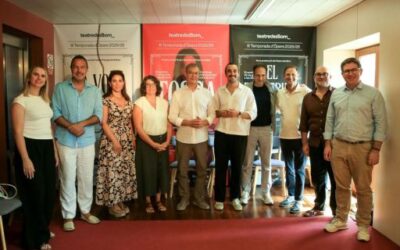Inca to celebrate the Can López neighbourhood festivities with an expanded and charitable program
by David Arreza | Aug 25, 2025 | Current affairs, Featured, Interview, Portada, Post, Revista Lloseta, Thursday Daily Bulletin, Tradition
On the weekend of August 30 and 31, Inca will once again host the traditional Can López neighbourhood festivities, which this year feature more activities and new additions. The Inca City Council, together with the president of the neighbourhood association, Xisco...
Son Llàtzer develops a pioneering artificial intelligence tool to improve the detection and treatment of chronic kidney disease
by Redacción | Aug 24, 2025 | Current affairs, Featured, Interview, Portada, Post, Revista Lloseta, Thursday Daily Bulletin, Tradition
An innovative project led by Son Llàtzer University Hospital, in collaboration with consultancy firm IQVIA and primary care professionals, has won first prize in the inERCia program thanks to the creation of a predictive model based on artificial intelligence that...
Authorisation granted for the cleaning service contract in 18 educational centres
by David Arreza | Aug 24, 2025 | Current affairs, Featured, Interview, Portada, Post, Revista Lloseta, Thursday Daily Bulletin, Tradition
The new contract goes out to tender with a value of €4.2 million spread over three years This measure ensures the continuity of an essential service for the proper functioning of educational centres The Consell de Govern today authorised the Minister of Education and...
New agreement secures 186 places for dependent elderly people in Mallorca
by Rosa María Cuerda Riutort | Aug 24, 2025 | Current affairs, Featured, Interview, Portada, Post, Revista Lloseta, Thursday Daily Bulletin, Tradition
The Ministry of Families, Social Welfare and Care for Dependency and the Institut Mallorquí d’Afers Socials (IMAS) have signed a cooperation agreement ensuring 186 places —40 day-care and 146 residential— for people over the age of 55 officially recognised as...
IMAS strengthens its role in training future social services professionals in Mallorca
by Rosa María Cuerda Riutort | Aug 24, 2025 | Current affairs, Featured, Interview, Portada, Post, Revista Lloseta, Thursday Daily Bulletin, Tradition
Department of Social Welfare During the 2024-2025 academic year, the Institut Mallorquí d’Afers Socials (IMAS) has consolidated its position as a reference institution for hands-on training in the social and healthcare fields. A total of 86 students from vocational...
Palma International Boat Show 2025 generates an economic impact of €21 million, 4.5% more than the previous edition
by Redacción | Aug 24, 2025 | Current affairs, Featured, Interview, Portada, Post, Revista Lloseta, Thursday Daily Bulletin, Tradition
The fair, organised by the Ministry of Business, Self-Employment and Energy, attracted more than 30,000 visitors and over 300 participating companies The study conducted by the Directorate General of Economy and Statistics confirms that the average spending of PIBS...
The Consell de Govern appoints Maria Joaquina Ferrer Matas as Director General of Coasts and Coastal Areas
by Rosa María Cuerda Riutort | Aug 24, 2025 | Current affairs, Featured, Interview, Portada, Post, Revista Lloseta, Thursday Daily Bulletin, Tradition
The new appointee has more than 25 years of experience in the regional administration Her career has been marked by legal and technical management related to the coast and the public sector The Consell de Govern today approved the appointment of Maria Joaquina Ferrer...
Restoration completed on the Virgin’s bier of Sant Jaume parish in Palma, thanks to institutional collaboration
by Rosa María Cuerda Riutort | Aug 23, 2025 | Current affairs, Featured, Interview, Portada, Post, Revista Lloseta, Thursday Daily Bulletin, Tradition
Department of Culture and HeritageThe joint work between the Bishopric and the island’s institution has also made possible the conservation of two monuments in the Part Forana: the Virgin’s bier of Sant Bartomeu parish in Capdepera and that of Sant Cristòfol parish in...
The Teatre Principal strengthens the island’s opera circuit with two productions in Ciutadella’s opera season
by David Arreza | Aug 23, 2025 | Current affairs, Featured, Interview, Portada, Post, Revista Lloseta, Thursday Daily Bulletin, Tradition
Department of Culture and HeritageTosca and La voix humaine, part of the 40th opera season, will also be staged at the Teatre des Born. The Teatre Principal of Palma, in line with its new strategic approach to collaboration with public performing arts venues in the...
SFM technicians travel to Kenya to provide training for mechanics and train drivers of the African country’s railway company
by Rosa María Cuerda Riutort | Aug 23, 2025 | Current affairs, Featured, Interview, Portada, Post, Revista Lloseta, Thursday Daily Bulletin, Tradition
SFM delivers training on the train units sold to Kenya five years ago, now operating on Nairobi’s commuter lines Technicians from Serveis Ferroviaris de Mallorca (SFM) have travelled to Nairobi (Kenya) to deliver a railway training program for mechanics and train...
UIB to introduce two new official master’s degrees starting in the 2025-2026 academic year
by Redacción | Aug 23, 2025 | Featured, Interview, Portada, Post, Revista Lloseta, Thursday Daily Bulletin, Tradition
The Consell de Govern has authorised the University of the Balearic Islands (UIB) to launch two new postgraduate programs: the Master’s Degree in Study and Management of Terrestrial Ecosystems in the Face of Global Change and the Master’s Degree in Global Health. Both...
The SOIB launches two grant calls to boost vocational training in Level B programs through 2027
by David Arreza | Aug 23, 2025 | Current affairs, Featured, Interview, Portada, Post, Revista Lloseta, Thursday Daily Bulletin, Tradition
A €13 million budget will provide training opportunities for both employed and unemployed individuals, as well as vulnerable groups The Employment Service of the Balearic Islands (SOIB) has approved two grant calls for the period 2025–2027 to strengthen vocational...
Our writters

SFM reinforces safety in transport and promotes the use of the train through actions with various collectives
The railway company signs an agreement with the Guardia Civil for the delivery of 300 transport cards and will extend this initiative to other entities
Serveis Ferroviaris de Mallorca (SFM) has signed a collaboration agreement with the 17th Zone/Commandery of the Civil Guard of the Balearic Islands to allow free travel to all its members in the services managed by the railway administrator. For this purpose, 300 non-nominative transport cards have been delivered to them, which can be used by all the members of this corps belonging to the demarcation of the island of Mallorca.
TDB keeps you informed. Follow us on Facebook, Twitter and Instagram
SFM
The cards provided through this initiative have an identification number that will allow to have a personalized record of its use by the Command and the main objective is that the members of the corps can have easy access to both train and metro stations to facilitate possible interventions or develop research and intelligence work, but also encourage the use of public rail transport among its members.
The measure gives continuity to other similar agreements already in effect by SFM, such as the one made under the same conditions with the National Police a few years ago or with the Local Police of Sineu, more recently. Likewise, SFM intends to follow the same steps with other local police forces in municipalities along the railway corridor.
On the other hand, SFM has opened the application for obtaining group tickets to new entities, such as associations or leisure and free time entities, the different groups of the Moviment Escolta i Guiatge de Mallorca, entities that work with people with functional diversity or senior citizens or other similar groups that want to benefit from the advantages of this ticket.
Until now, the purchase of group tickets was authorized exclusively to schools attached to the Ministry of Education of the Government of the Balearic Islands, being free of charge for students in kindergarten, primary and secondary schools and offering very low fares for the rest of the courses.
It should be remembered that the group ticket must be requested to SFM in advance and following the established channels and it is not necessary to have the Intermodal Card to make use of it by any member of the group traveling on the train. It is a type of ticket widely used for excursions or outings by schools since, apart from the economic benefit if you do not have an Intermodal Card, it allows you to organize the trip with the advice of the railway company’s staff and speeds up the access and exit of the stations for the comfort and safety of both the group making the trip and the rest of the users of the railway network.
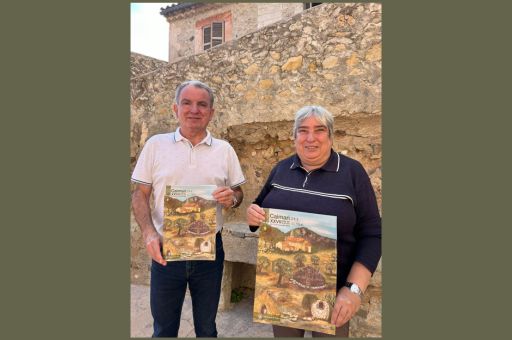
XXVII Fair of S’Oliva de Caimari
The mayor of Selva, Joan Rotger, and the mayoress of Caimari, Ana Maria Roger, have presented the events of the S’Oliva de Caimari Fair to be held on 15th, 16th and 17th November.
This emblematic fair dedicated to the culture and tradition of the olive in the town of Caimari reaches its 27th edition with the intention of making known and enjoying the olive-growing tradition that defines our municipality.
During the fair, you will be able to discover a wide variety of products derived from olives, from virgin olive oil to gastronomic delicacies made with local products. In addition, we will have demonstrations and tastings of our products, as well as exhibitions on the history and culture of the olive in Caimari.
We look forward to seeing you at the 27th S’Oliva de Caimari Fair.
TDB keeps you informed. Follow us on Facebook, Twitter and Instagram
XXVII Fair of S’Oliva de Caimari
FRIDAY 15TH
Distribution of olive branches.
18:00 h. Opening of the Església Vella to visit the exhibition of paintings by Maria Muntaner and Joan Perelló.
19:30 h. Concert by the Selva Municipal Band.
Venue: Church of the Immaculate Conception of Caimari.
21:30 Oil tasting
By local farmers and producers with musical entertainment.
In collaboration with: Bar Ca Na Tome.
Bar Ca Na Tome, will make a special Fair toast dinner.
Franquesa Street n.°4
SATURDAY 16TH
10:00 h Opening of the Fair.
Exhibition of antique motorbikes.
By Jaume Damià.
Place: Sa Vileta street.
Exhibition of posters of the Caimari Fair.
Exhibition of Randas and Embroidery of the Women of the 3rd Age of Caimari.
Place: Horizonte Street.
Opening to the public of the old Tafona-Museum of Caimari.
Exhibition of machinery and utensils for making oil.
Place: Plaza Mayor de Caimari.
Tasting and sale of olives and all kinds of virgin olive oil by local producers.
Inauguration and exhibition of paintings by:
MARGALIDA MUNTANER, a painter from our town.
JOAN PERELLÓ, painter and sculptor will exhibit his works in the Església Vella de Caimari.
11:00 h Presentation of the II Edition of the Olive Academy.
This year dedicated to OLIVE HARVESTS.
The Mayoress of Caimari, Ana María Rotger Mestre ‘Mari Tome’ will dedicate a few words to the women olive harvesters, recalling their dedication, sacrifice and love for the trade.
Presentation of the audiovisual dedicated to Les Collidores de Oliva de Caimari.
16:00 h Reception of the Authorities.
Accompanied by xeremiers of the municipality to visit the XXVII Fair of S’Oliva de Caimari.
Start in the street of Ca S’Hereu.
17:30 h Departure of the Caparrots Carboners de Caimari accompanied by the Xeremiers.
Start in Es Castellet.
First dance of the Caparrots Carboners, in front of Sa Tafona Vella de Caimari.
Then: Parade of the Caparrots Carboners through the streets of the Fira.
18:00 h Dance of the Caparrots Carboners accompanied by the Band of Music of the Municipality of Selva.
Place: Plaza Mayor de Caimari.
20:00 h Folklore Show
With the performance of the Agrupación Aires de Monte de Selva.
Place: Plaza Mayor de Caimari.
21:00 Sobrasada tasting with honey.
Collaboration: Association of Elderly People of Caimari.
Place: In front of the Casa del Pueblo de Caimari, Plaza Mayor.
SUNDAY 17TH
10:00 h Opening of the Fair.
Exhibition of old motorbikes.
By Jaume Damià.
Place: Sa Vileta street.
Exhibition of posters of the Caimari Fair.
Exhibition of randas and embroidery by the Women of the 3rd Age of Caimari.
Place: Horizonte street.
Exhibition of paintings and sculptures by:
Margalida Muntaner
Joan Perelló
Place: Old Church of Caimari.
Demonstration of how to make sheep’s milk cheese.
Place: Plaza Mayor.
Display of craft stalls throughout the Fira.
Prize-giving ceremony for the Best Local Parade.
Presentation of the prize for the Best Fair Parade.
11:30 h Dance of the Caparrots Carboners accompanied by the Band of the Municipality of Selva.
Place: Clasta de Son Albertí. Placeta Vieja.
Then: Parade of the Caparrots Carboners, through the streets of the Fira.
12:00 h Dance of the Caparrots Carboners accompanied by the Band of the Municipality of Selva.
Place: Plaza Mayor de Caimari.
17:30 h Popular Dance with the music of Ballugam.
Place: Plaza Mayor de Caimari.
19.00 h Parade with the Xeremiers of the municipality.
20.00 h Closing of the XXVII Fair of S’Oliva de Caimari.
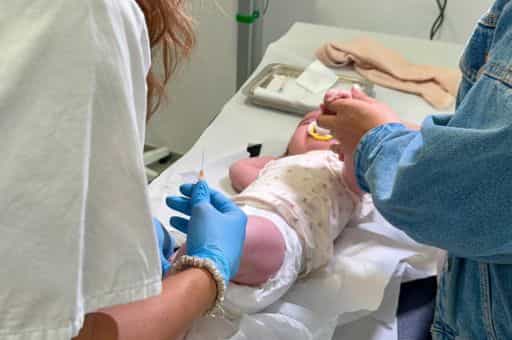
Health reinforces child vaccination against pneumococcus with a more complete vaccine
From this April, the Balearic Islands will improve the children’s vaccination schedule with the inclusion of the 20-valent pneumococcal conjugate vaccine. Until now, and since 2016, babies have been immunised against 13 serotypes in three doses. From this April, and following the authorisation of the European Medicines Agency for the use of the 20-valent pneumococcal conjugate pneumococcal vaccine, the Balearic Islands will be the first Autonomous Community to include this booster vaccine in the children’s vaccination schedule.
TDB keeps you informed. Follow us on Facebook, Twitter and Instagram
Health reinforces child vaccination against pneumococcus
The Director General of Public Health, Elena Esteban, explained this morning, in a presentation at the Palmanova health centre, all the details of the vaccine recently incorporated into the children’s vaccination schedule, which can achieve up to four times more protection than the previous vaccine of 13 serotypes, taking into account the circulating serotypes.
As explained by Elena Esteban, who was accompanied by the coordinator of the Primary Care vaccination centre, Verónica Vega, the immunisation of babies with the new drug will be carried out in four doses: at 2, 4 and 6 months, with a booster at 11 months.
This booster vaccine with 20 serotypes has been included in the adult population’s schedule as a single dose since last October. Vaccination against pneumococcal disease in adults is indicated for people aged between 65 and 75 years and people with risk factors for invasive pneumococcal disease: transplant recipients, cancer patients, immunocompromised people, people with immunodeficiencies, cardiovascular or respiratory diseases or people institutionalised in nursing homes.
The Directorate General of Public Health of the Regional Ministry of Health has purchased 40,000 doses for the period between 31 March 2024 and 30 March 2025, with an investment of 1,961,000 euros. Of these, 25,500 doses are expected to be administered to the paediatric population, which usually achieves a vaccination coverage of 90%.
Pneumococcal pneumonia and invasive pneumococcal disease (IPD) are a major health problem, mainly associated with the existence of risk factors and also related to age. In Spain, in recent years, the National Epidemiological Surveillance Network (RENAVE) has recorded between 3,000 and 4,000 cases per year, mainly affecting children under five years of age and older people.
Vaccination is an essential tool to prevent invasive pneumococcal disease, and for this reason, the vaccine was included in the children’s schedule in 2016. In the case of older people, the vaccine was already administered to people in at-risk groups and 2018 the Public Health Commission approved universal vaccination at 65 years of age.

The number of foreign affiliates increased by 15,804 employed persons in February, of which 4,204 were self-employed
They account for 13.8% of the total number of Social Security contributors, six-tenths of a percentage point more than last year. Since the implementation of the labour reform, 44.1% of the employment created in the last three years has been by foreign workers.
Social Security registered 2,971,811 foreign affiliates in February, after discounting seasonality and the calendar effect, after adding 15,804 employed persons. Over the last twelve months, the number of people employed from other countries has increased by 7.6%. This is a new high in seasonally adjusted foreign employment, in line with the trend that has been maintained throughout 2024.
The number of foreign affiliates increased by 15,804 employed persons in February, of which 4,204 were self-employed
TDB keeps you informed. Follow us on: Facebook, Twitter and Instagram
Since the implementation of the labour reform in 2022, the system has seen an increase of 604,592 workers from other countries, i.e. an increase of 26.6%. This means that 44.1% of the employment created in these last three years corresponds to foreign workers.
In the context of overall enrolment, foreign workers account for 13.8% of the total number of employed, six-tenths more than a year ago.
Average enrolment
In average terms and without seasonal adjustment, i.e. in the original series, Social Security registered 2,874,398 affiliates from other countries, 202,851 more in the last year and 31,369 more than in January.
This is the highest number of total foreign contributors to Social Security, both in the original series and seasonally adjusted for February.
Self-employed workers
With regard to the distribution by regimes, the increase in self-employed workers from other countries is worth noting. In the last month alone, there has been an increase of 4,204 foreign workers in the Special Regime for Self-Employed Workers (RETA).
In February, foreign workers accounted for 90% of the rate of increase in the RETA over the last year (1.1% of the 1.2% of the total). Specifically, there are 471,559 workers registered in this special regime, an increase of 8.2% in year-on-year terms, and they represent 16.4% of the total number of self-employed workers in Spain.
The increase in the number of foreign self-employed in the last year has been particularly pronounced in the Information and communications sector, which has grown by 34.5%. Also of note is Professional, Scientific and Technical Activities, which has seen a 17.3% increase in the number of self-employed workers.
General Scheme
In line with the situation of native workers, 83.4% of foreign affiliates were enrolled in the General Social Security Scheme, reaching 2,398,066 workers.
In the last 12 months, foreign enrolment in this scheme has grown by around 7.5%, and in seven sectors in particular: Transport and Storage (24.9%), Water Supply (11.9%), Administrative Activities (9.7%), Health Activities (9.6%), Construction (9.4%), Manufacturing Industry (9.3%) and Accommodation (9.10%).
The year-on-year growth in foreign enrolment is also very notable in high value-added activities, with notable growth in Financial Activities (9%), Professional, Scientific and Technical Activities (7.6%) and Information and Communications, which increased by 7%.
The distribution by sector in both the General Regime and the Self-Employed Workers’ Regime shows a growing diversification.

The Government approves the fifth payment of 2024 housing rental aid, reaching €7.4 million for more than 3,100 beneficiaries
All information about these grants can be found at ajudeslloguer.caib.es
The Ministry of Housing, Territory and Mobility of the Government, through the Directorate General of Housing and Architecture, has approved the fifth payment of the 2024 housing rental aid program, amounting to nearly €1.7 million for 715 beneficiaries.
The payment resolution was published this Tuesday in the BOIB (Official Gazette of the Balearic Islands), and all details of these grants can now be consulted on the website ajudeslloguer.caib.es.
TDB keeps you informed. Follow us on: Facebook, Twitter and Instagram
The Government approves the fifth payment of 2024 housing rental aid, reaching €7.4 million for more than 3,100 beneficiaries
With this fifth payment resolution for the 2024 aid program, a total of €7.4 million has been disbursed so far to 3,133 beneficiaries.
Regarding the distribution by island, of the total 2024 aid granted:
- 2,259 beneficiaries in Mallorca, amounting to €5.3 million;
- 586 in Menorca, exceeding €1.3 million;
- 240 in Ibiza, nearly €640,000; and
- 48 beneficiaries in Formentera, totalling around €118,000.
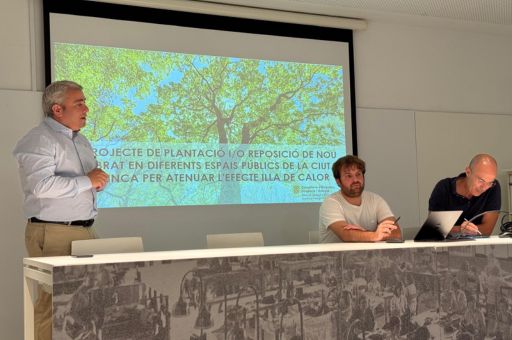
Inca will improve the city’s street furniture to mitigate the heatwave effect
Inca City Council is promoting a project to plant and replace new trees in different public spaces in the city to mitigate the heatwave effect. Thus, the corresponding tenders have already been launched and it is expected that at the beginning of next year work will begin in the different areas and, progressively, work will be carried out in the affected streets. At the same time, an information session was also held to explain the details of the project and all the initiatives that will be carried out over the next few months to the citizens of the town.
TDB keeps you informed. Follow us on Facebook, Twitter and Instagram
Inca will improve the city’s street furniture to mitigate the heatwave effect
‘The tree planting plays a fundamental role in the environmental quality of the city. That is why we have promoted this project to make a decisive contribution to improving the management and use of urban green infrastructure. The regulation of the temperature or the capture of pollutants are some of the positive effects of the trees that directly affect people’s health’, explains the mayor of Inca, Virgilio Moreno.
Thus, the general objectives of this project are to improve green infrastructures and link them to the natural context, to increase resilience in the face of climate change and to guarantee the quality and accessibility of public spaces. Likewise, these actions will also help to lower the city’s temperature, reduce solar radiation during the hottest months, increase CO2 capture and oxygen production, reduce pollution (O3, CO, NO2, PM2.5, PM10, SO2), increase carbon capture, reduce pollution (O3, CO, NO2, PM2.5, PM10, SO2), increase carbon sequestration, reduce pollution and increase infiltration.
The specific areas of action of this project are Carrer Marjades, Carrer Josep Barberí, Carrer Joan Miro, Carrer Sor Clara Andreu, Carrer Joan d’Àustria, Avinguda Jaume I and Avinguda Jaume II. The work being carried out as part of this project includes increasing the tree cover on the streets, removing trees in poor condition or that interfere with services, buildings or installations, increasing the permeable area of the scarcely accessible area and improving pedestrian walkways to improve accessibility, among other things.
This project is co-financed by the Conselleria d’Empresa, Ocupació i Energia within the framework of the public call for subsidies to local entities for actions to adapt to climate change in urban and peri-urban areas. The subsidised amount is 300,000 euros.
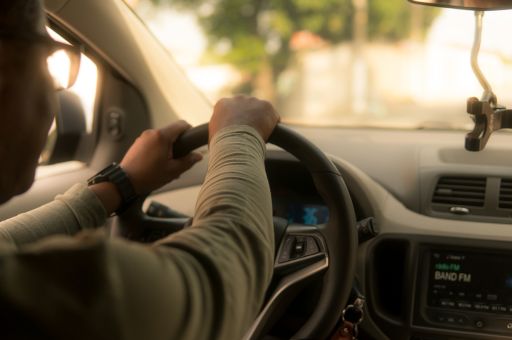
The Consell de Mallorca meets with car hire companies to study solutions to the saturation of roads
The Minister of Territory, Mobility and Infrastructures, Fernando Rubio, today received representatives of AEVAB and BALEVAL to gather their contributions to the study of the road network load that the island institution is preparing.
TDB keeps you informed. Follow us on Facebook, Twitter and Instagram
The Consell de Mallorca meets with car hire companies
The Minister of Territory, Mobility and Infrastructures, Fernando Rubio, met today with representatives of the two car hire associations of the Balearic Islands to study measures agreed with the sector to study solutions to the saturation of Mallorca’s roads. Rubio was accompanied by the island directors of Mobility, Rafael Oliver, and Infrastructures, Rafel Gelabert. The delegation from the Agrupación Empresarial de Alquiler de Vehículos con y sin Conductor de Baleares (AEVAB) was headed by its president Ramon Reus. For its part, the Balearic Association of Car Rental with and without Driver (BALEVAL) was represented by its board of directors, chaired by Othman Ktiri.
Fernando Rubio explained that the Department of Territory, Mobility and Infrastructures is working intensively to draw up a study of the load on the island’s roads, a document that until now has never been carried out in Mallorca to find out with official and contrasted data what the causes of the traffic jams on Mallorca’s road network are. Rubio reiterated that the study will also propose solutions, both with infrastructures and possible regulations, and that the Consell is ‘willing to take courageous measures’ to improve the mobility of Mallorcans, as the president of the Consell de Mallorca, Llorenç Galmés, has stated on several occasions.
The car hire companies have shown their willingness to collaborate with the Consell in the search for effective solutions to alleviate the saturation of the island’s roads.
Today’s meetings with AEVAB and BALEBAL are the second that the Department of Territory, Mobility and Infrastructures will hold with representatives of the sectors involved and civil society. The aim is to hear their opinions first-hand and reach a consensus on possible solutions to the saturation suffered by Mallorca.
307 million euros in European aid awarded to 381 local authorities to renovate public buildings
The Ministry of Transport, Mobility and Urban Agenda (Mitma) has provisionally awarded these ‘Pirep local’ grants, which will directly benefit some 16 million citizens.
The Ministry of Transport, Mobility and Urban Agenda (Mitma) has provisionally granted 307 million euros of European recovery funds to 381 local authorities in all provinces for the rehabilitation of public buildings owned by them.
TDB keeps you informed. Follow us on Facebook, Twitter and Instagram.
The Mitma’s electronic headquarters has published this provisional resolution of the call in competitive concurrence of Line 1 of the Programme to Promote the Rehabilitation of Public Buildings (Pirep local) included in the Recovery, Transformation and Resilience Plan (PRTR).
In total, Mitma has selected 405 actions out of the 1,065 presented by the potential beneficiaries of the programme: municipalities, provincial councils, councils and island councils. At this point, it is worth remembering that municipalities with more than 50,000 inhabitants and provincial capitals could submit two applications, so there are 24 municipalities that have obtained funding for two rehabilitation projects.
Even so, the municipalities with less than 50,000 inhabitants are of particular relevance in the provisional resolution, with 321 projects awarded, which are entitled to aid of some 186 million euros, with an average subsidy per application of 579,531 euros. Of these 321 projects, 172 are in municipalities with less than 5,000 inhabitants, the so-called demographic challenge municipalities.
After the publication of the list, the selected local entities will have a period of 10 days to expressly accept the grants, before the final resolution is published.
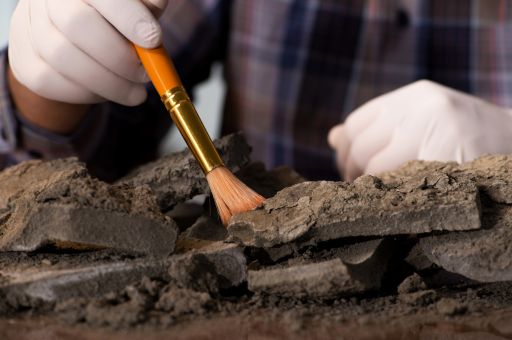
The Consell de Mallorca subsidises a total of 10 archaeological research projects over three years with almost 700,000 euros
The initiative includes projects by universities, town councils and private individuals that will promote studies on the chronology and practices of the past.
The Consell de Mallorca is subsidising a total of 10 archaeological research projects over three years with a total of 692,415 euros. The aim is to promote scientific archaeological research on the island and contribute to the conservation and maintenance of the island’s historical heritage.
The vice-president of the Consell de Mallorca and councillor of Culture and Heritage, Antònia Roca, explained that the selected projects contemplate different lines of research, including the analysis of ancient structures, studies of chronology and functionality, and studies on past fauna and flora. The subsidy will be distributed as follows: 140,641 euros in 2024, 276,889 euros in 2025 and 274,885 euros in 2026.
TDB keeps you informed. Follow us on Facebook, Twitter and Instagram
The Consell de Mallorca subsidises a total of 10 archaeological research projects over three years with almost 700,000 euros
The grant programme includes projects promoted by universities, research centres, town councils and other entities. ‘This diversity reflects the richness and transversality of archaeology as a fundamental discipline for society,’ says Roca. He also stresses that ‘with this initiative, we reaffirm our commitment to the preservation of Mallorca’s cultural heritage and support researchers who contribute to the understanding of the island’s history and identity’.
It is important to note that in 2024 the Consell de Mallorca has allocated a total of 565,000 euros to seven municipalities on the island to acquire archaeological sites: Manacor, Alcúdia, Petra, Selva, Santa Margalida, Llubí and Sencelles will thus be able to incorporate spaces of great historical and cultural value into their public heritage.
Visit to the Es Turassot archaeological site
The Vice President of the Consell de Mallorca and Councillor of Culture and Heritage, Antònia Roca, visited the Es Turassot site in Costitx, along with the Mayor of Costitx, Antoni Salas, one of the subsidised projects that received the highest scores for its quality, suitability and technical, temporal and economic viability.
In this navetas settlement, the council will carry out excavations to analyse the domestic and economic practices of the period, as well as the chronology and functionality of its structures. Roca stresses that ‘this project will provide a better understanding of the spatial organisation, economic activities and cultural changes in the settlements of the Pla de Mallorca, which will contribute to scientific knowledge and the dissemination of the island’s archaeological heritage’.
Salas stresses that ‘the navetas settlement of Es Turassot is a unique opportunity to enhance the historical heritage of Costitx, as it is an exceptional testimony to understanding how the communities of the Pla de Mallorca lived and interacted millennia ago’.
Beneficiaries
The beneficiaries of these 10 projects are universities and research centres, local councils and individuals. Specifically, the beneficiary universities and research centres are the UIB, which will carry out two studies: one on the Indigenous communities of Mallorca during the Iron Age and another on the Closos de Can Gaià and its surroundings; the IMEDEA, which will study the chronology and functionality of Mallorcan sanctuaries; the Instituto de Ciencias del Patrimonio-CSIC, which will carry out an interdisciplinary research project on the exploitation and use of copper in the prehistory of Mallorca; the Institut Català de Paleontologia Miquel Crusafont (ICP), which will study the island’s early ecosystems; and finally, the University of Valencia, which will re-excavate the Sec shipwreck to understand commercial and technological aspects.
As for local councils, the beneficiaries are Costitx Town Council, which will carry out the excavation and study of the set of navetas of Es Turassot, from the Talayotic period, to analyse domestic and economic practices; Montuïri Town Council, which will investigate the transformations of the Son Fornés settlement after the Talayotic period; and Santanyí Town Council, which will carry out a study on fortifications and social changes in Mallorcan settlements in the Second Iron Age.
Finally, as far as private individuals are concerned, there is only one beneficiary: the Sóller Botanical Garden Foundation – Balearic Museum of Natural Sciences, which will carry out a study on fauna and flora linked to extreme climatic periods in the Mediterranean.
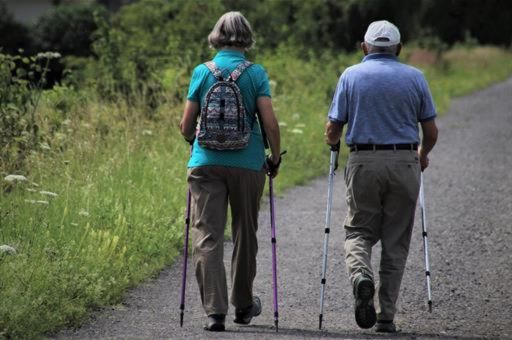
The Government revises upwards the “pension fund”, which will close the year with 9,300 million
The Social Security Reserve Fund exceeded 8.3 billion euros in September and will end 2024 with 300 million more than expected.
The Social Security Reserve Fund reached €8.356 billion on September 30, the highest level since December 2017, and is set to end the year with nearly €9.3 billion accumulated.
TDB keeps you informed. Follow us on Facebook, Twitter and Instagram
The Government revises upwards the “pension fund”, which will close the year with 9,300 million
The so-called ‘pension piggy bank’, which ended 2023 with 5,578 million euros, has so far this year received contributions worth 2,623 million euros, thanks to the Intergenerational Equity Mechanism, which came into force in 2023, to provide resources to this fund through a percentage of the contribution for common contingencies, distributed between the company and the worker with the same distribution as in social contributions.
In September alone, the Reserve Fund received allocations of 314.7 million euros, to which will be added those corresponding to the last three months of the year.

The Consell de Mallorca opens the doors of its most emblematic buildings during Open House Palma
The island institution will be showing the Palau del Consell, the Llar de la Infància, the Teatro Principal and the Museum of Mallorca this weekend
The Consell de Mallorca has once again joined the Open House Palma initiative and will open the doors of four of its buildings. This Saturday and Sunday citizens will be able to visit the most emblematic buildings of the island’s institution free of charge and with a guided tour. The novelty this year is that, for the first time, it will be possible to visit the Llar de la Infància.
TDB keeps you informed. Follow us on Facebook, Twitter and Instagram
The Consell de Mallorca opens the doors of its most emblematic buildings during Open House Palma
This is the fourth edition of Open House Palma, whose motto this year is ‘La ciutat per a qui l’habita’ (The city for those who live in it). In addition to the Llar de la Infància, the island institution will be opening the Palau del Consell, the Teatro Principal de Palma and the Museum of Mallorca. There is no need to register in advance for the visits; it is a free-access space. Once there, the volunteers will indicate the approximate waiting time for the visit.
The Palau del Consell de Mallorca and the Llar de la Infància will be open on Sundays from 10 am to 2 pm and from 4 pm to 7 pm. Palma’s Teatro Principal can be visited on Saturday from 10 am to 2 pm, and the Museum of Mallorca will also be open on Saturday from 4 pm to 7 pm.
Carla Beltrán Campomar
Carla is a student of the Second Baccalaureate at IES Binissalem. Since she was a child, she has shown great admiration for the media. So much so that in the future, she would like to become a reporter. Despite her little experience in the world of journalism due to her young age, her passion for exhibiting her personal work to the public has led her to participate in numerous dance competitions, plays, concerts and the occasional appearance on the provincial television of the Balearic Islands (IB3) and on the municipal television of Palos de la Frontera, Huelva (TCD).
Ramón Planes Socies
ESCAC student in Terrassa will teach us how to tell stories from any of the disciplines taught at ESCAC: directing, art direction, documentary, screenwriting, editing, production, sound design or visual effects production.
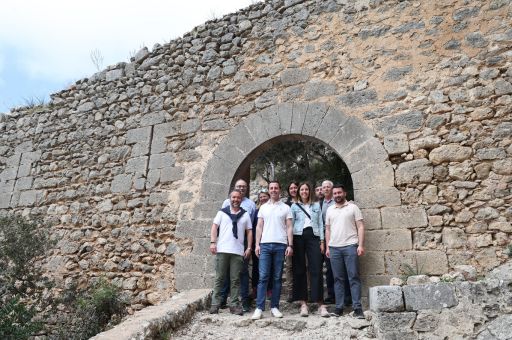
The Consell de Mallorca asks the Ministry of Culture to temporarily cede the Castle of Alaró for its urgent conservation
This is the second request sent by the island institution since last April: if no response is received, action will be taken by the subsidiary execution mechanism provided for in the Law on Historical Heritage.
The Consell de Mallorca requests the Ministry of Culture to temporarily cede Alaró Castle for its urgent conservation. The vice-president of the Consell de Mallorca and councillor of Culture and Heritage, Antònia Roca, has informed that this is the second request made to the Spanish government since last April and assures that, should the administrative silence continue, the Consell de Mallorca will initiate the necessary actions to guarantee the conservation of the Castle of Alaró.
TDB keeps you informed. Follow us on Facebook, Twitter and Instagram
The Consell de Mallorca asks the Ministry of Culture to temporarily cede the Castle of Alaró for its urgent conservation
Roca explained that Alaró Castle, a state-owned Asset of Cultural Interest (BIC), is in a state of deterioration that threatens its stability and the safety of visitors. This alarming deterioration in recent years affects the walls in particular.
Despite the joint efforts of the Consell de Mallorca and the Alaró Town Hall, no significant intervention has been carried out by the Ministry of Culture, the monument’s owner. Roca believes that the situation is unsustainable and that immediate intervention is necessary, which the island’s institution will carry out if the Ministry continues to neglect the monument.
The first phase of the conservation project proposed by the Consell de Mallorca would focus on the castle’s access area, with actions that include removing vegetation, repairing areas of deterioration on the walls and replacing construction mortar.
‘Alaró Castle is a symbol of our heritage, but if we do not act soon, we run the risk of losing a cultural asset of great value. We demand that the Ministry of Culture authorise us to intervene urgently and that it temporarily cede the use of the castle to us so that we can carry out these conservation works,’ said the vice-president and councillor Antònia Roca. ‘If we do not receive a response, the Consell de Mallorca will act by the subsidiary execution mechanism provided for in the Law of Historical Heritage of the Balearic Islands,’ she explained.
The Consell de Mallorca has included in its request detailed technical reports, including the conservation report of July 2021 and the technical report of 2024, which show the need for immediate action to guarantee the safety of the monument.
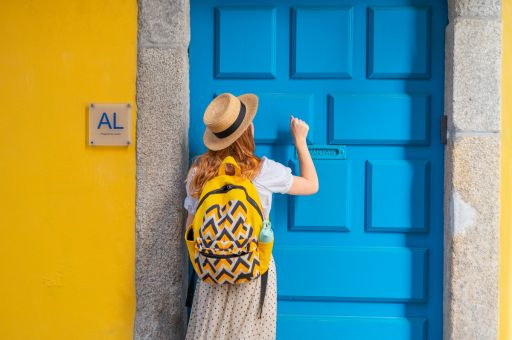
The Consell de Mallorca triples the number of actions against illegal tourism in the summer campaign 2024
The Department of Tourism closes the summer campaign with 2,554 actions in total, 70% of which have been focused on combating illegal activity in the tourism sector
The Department of Tourism of the Consell de Mallorca has closed the summer campaign, which included an ambitious inspection plan, with a total of 2,554 actions throughout the island, to ensure the proper functioning of all tourist activity that takes place in Mallorca. The campaign was carried out from 15 June to 15 November to combat illegal supply and any other type of irregularity that may occur in the island’s regulated supply.
TDB keeps you informed. Follow us on Facebook, Twitter and Instagram
The Consell de Mallorca triples the number of actions against illegal tourism in the summer campaign 2024
The results, as announced this Thursday at a press conference by the Councillor for Tourism, José Marcial Rodríguez Díaz, have been ‘very satisfactory’, with ‘70% of the actions focused directly on combating illegal supply in the sector’. Specifically, of the 2,554 total actions, in these 5 months, the inspectors have carried out 1,765 visits against this type of offer, ‘three times more than a year ago (593)’, and have resulted in the opening of a total of 245 infringement proceedings, 10.3% more than in the same months of 2023, when there were 222.
In this line, Rodriguez has detailed that these 2,554 actions have responded to both complaints and claims received by the department, as well as the activity of the summer campaign promoted by the inspection service to control illegal tourist activity in all types of establishments. In addition, the total number of visits (2,554) is also three times the number made in the same period in 2023, when there were 969.
Results of the plan
Rodríguez also advanced some results obtained during 2024 against illegal supply and revealed that up to October (latest available data) the number of total inspections against illegal supply has tripled compared to a year ago (3,102 vs. 1,028), with a 13% increase in the number of infringement reports issued.
In terms of sanctions, Rodríguez detailed that 179 proceedings were opened in 2024 and approximately 78 have already been resolved. The total amount proposed as a sanction in these proceedings opened in 2024 was 4.42 million euros.
On the other hand, over the last few months, the inspection service has also focused its efforts on locating and pursuing repeat offenders. In this way, with a prior list provided by the sanctioning department, of 91 reports with the result of a sanction, the inspectors have gone to 51 of the 91 properties, issuing 6 infringement reports, so recidivism has been found in 11.76% of the properties previously sanctioned.
Finally, the summer campaign was also aimed at checking the 3% of local produce in Mallorca’s establishments. Specifically, the establishments included in the summer campaign were finally 188, 20% more than those initially announced (152), which were asked to provide the relevant documentation to prove their compliance.
Of these 188 establishments, 86 have replied, with a 100% compliance rate. The rest of the establishments are awaiting their response, which will be forthcoming in the coming weeks.
The Councillor for Tourism concluded his speech by assuring that ‘the plan implemented last year works, it is appropriate and allows us to fight against illegal supply, whatever type it is and whatever sector it operates in’.
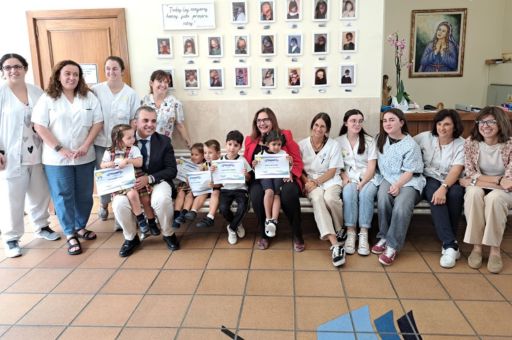
The Pilot Plan for Childhood Immunisation against the flu has now been completed in 16 schools
The councillor for Health, Manuela García, and the councillor for Education, Antoni Vera, attended the vaccination of 237 children at the Santa Mónica school in Palma, 65% of those vaccinated.
The pilot school immunisation plan continues, with 2,900 students born between 2019 and 2021 to be vaccinated.
The councillor for Health, Manuela García, accompanied by the councillor for Education, Antoni Vera, went today to the Santa Mónica school in Palma to show her support for the flu vaccination of 237 children in the second cycle of infant education, 65% of the 365 children enrolled in the school at these educational levels.
TDB keeps you informed. Follow us on Facebook, Twitter and Instagram
The Pilot Plan for Childhood Immunisation against the flu has now been completed in 16 schools
The heads of Health and Education were accompanied during their visit to the Santa Mónica school by the director of Primary Care Nursing, Victòria Pascual, and Toñi Tarongí, pedagogical director of Infant and Primary Education, among other authorities.
Manuela García welcomed the high percentage of pupils whose parents gave their permission for them to be vaccinated and thanked them for their responsible attitude, reminding them that vaccination is recommended for this group of healthy children because the flu does not cause the most common symptoms of the epidemic disease, such as fever and fatigue, among them. ‘Young children who contract the flu can have serious complications such as pneumonia, asthma attacks or otitis,’ he said.
Vaccination is also recommended for this group even though the lethality rate among children under 15 years of age is very low. Ninety-five per cent of children who die from the disease are under five years of age.
Moreover, this age group has the second highest rate of hospitalisation and ICU admission due to influenza after the elderly. Not to mention the role that these children play in transmitting the flu in their homes and with their close relatives, sometimes elderly and fragile people in whom contagion can have tragic consequences.
These children under five years of age have been immunised as part of the pilot child vaccination plan, which was launched in coordination with the Ministries of Health and Education on Monday 14 October and will continue until 14 November. In this pilot scheme, 2,900 schoolchildren born between 2019 and 2021 from 24 public and state schools on the islands, as well as one private school, will be able to be immunised in their school. Eleven schools in Mallorca, eight in Ibiza and Formentera and five in Menorca are participating in this plan. This pilot plan has already been completed in 16 schools.
The acceptance rates for this vaccination at school have been as follows, by island: in Mallorca, 52%; 40% in Menorca; 32.3% in Ibiza and 50% in Formentera.
The children participating in this pilot plan are immunised in complete safety. Nurses from the health centres closest to the schools come to the classrooms with a first-aid kit to treat any possible adverse effects of the vaccines and remain there for up to half an hour after the last child has been immunised to prevent them from occurring. Children with severe egg allergies or intolerances or those with significant immunodeficiency will be excluded from this school vaccination.
Children aged 2 years to 4 years and 11 months have been given a convenient and painless intranasal flu vaccine. For the youngest children, from six months to two years of age, an inactivated injectable vaccine will be administered.
Inés Bennasar
Inés Bennasar helps those most in need, from Bunyola. This mother of 14 cats, 1 dog, 4 sheep and 1 pig, will be in charge of giving voice to all those little balls of love, who have not been so lucky. This way we will know that second chances exist and we will put emphasis on looking for them.
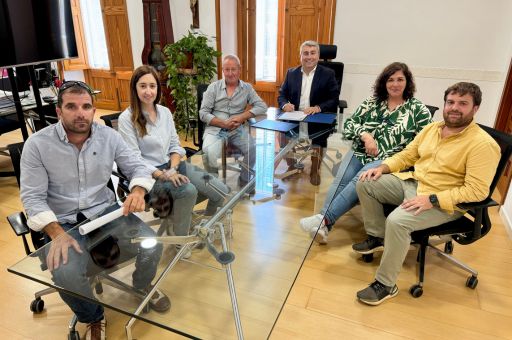
Inca Town Council and the Pagesa de Inca Cooperative signed a collaboration agreement for the modernisation of their facilities
The Inca Town Council reaffirms its commitment to the farming sector and local farmers with the approval of a direct subsidy to the Pagesa de Inca Cooperative. In this way, the town council of the capital of Raiguer has granted a subsidy of 40,000 euros to improve the development of its work and contribute to increasing efficiency and sustainability.
TDB keeps you informed. Follow us on Facebook, Twitter and Instagram
Inca Town Council and the Pagesa de Inca Cooperative signed a collaboration agreement
“This agreement is another example of the commitment of the Inca Town Council to the local agricultural sector. The Pagesa de Inca Cooperative plays a crucial role in our community and this modernisation of their facilities will allow them to continue their valuable work more efficiently,” says the Mayor of Inca, Virgilio Moreno.
The main objective of this direct subsidy is to provide economic support to the farmers of Inca, in order to promote the maintenance and growth of the sector. This aid will provide the Cooperativa Pagesa de Inca with the resources necessary to equip and modernise the shop, warehouse, offices and meeting room at the headquarters of the Cooperativa Pagesa de Inca.
“The main objective of this grant is to strengthen the sector and ensure its sustainable development. In this way, we support the Cooperativa Pagesa de Inca, a reference entity in the town, in its work of advising and training local farmers, as well as promoting agriculture and the development of the primary sector in Inca”, explains the councillor for the Environment, Helena Cayetano.
The signing of the grant agreement for the modernisation and adaptation of the cooperative’s headquarters was presided over by the mayor of Inca, Virgilio Moreno, and the president of the Pagesa de Inca Cooperative, Tomeu Martorell. Also present at the meeting were the councillor for the Environment, Helena Cayetano, and other representatives of the cooperative.
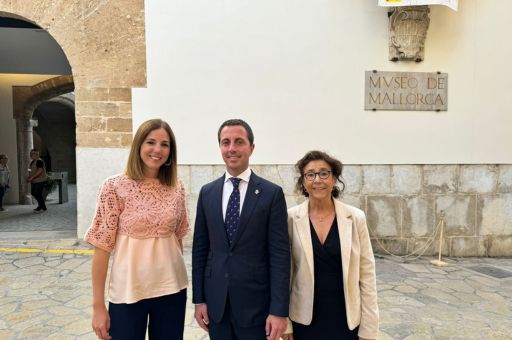
The Consell de Mallorca organises an exhibition dedicated to Sorolla: for the first time, the 12 works he produced on the island will be shown together
The exhibition will be on display at the Museum of Mallorca from 3 June to 8 September.
The Consell de Mallorca is organising an exhibition dedicated to Joaquín Sorolla. The president of the Consell de Mallorca, Llorenç Galmés, has announced that “for the first time, the 12 works that the artist produced on the island will be shown together in the same room”.
TDB keeps you informed. Follow us on Facebook, Twitter and Instagram
The Consell de Mallorca organises an exhibition dedicated to Sorolla
The exhibition will be inaugurated on 3 June at 7 p.m. at the Museum of Mallorca and will be open until 8 September. During these months, stressed the president of the Consell de Mallorca, Llorenç Galmés, “it will be possible to enjoy the essence of Sorolla: his textures, brushstrokes and experimentation with colours and light that he carried out in places like Palma, the coast of Valldemossa and Pollença”.
The Sorolla Museum has contributed 10 works that the artist produced on the island: seven paintings of Cala Sant Vicenç, a portrait of a pagan woman and two of Mallorcan houses. In addition, Es Baluard and a private collection in Madrid have left two more works by Sorolla that complete his journey around Mallorca.
This is the last stop of the project “Sorolla. Travelling to paint”, which is being carried out to commemorate the centenary of the death of Joaquín Sorolla Bastida (1863-1923), an event declared an Event of Exceptional Public Interest for the years 2022, 2023 and 2024. The aim is to take Sorolla’s works to the main places where they were executed: they have already been to San Sebastián, Toledo, Galicia, Valladolid and Seville, and the last stop is Mallorca.
Sorolla was in the Balearic Islands in the summer of 1919. This trip was of particular importance for the painter’s career, as the paintings made on this trip were Sorolla’s last view of the Mediterranean, as the following June he suffered the cardiovascular accident that kept him away from painting until the end of his life three years later. “This exhibition, therefore, represents the perfect closure to the project,” said Galmés.
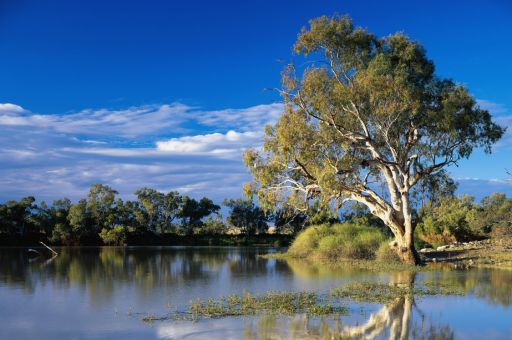
Water reserves in the Balearic Islands increase to 46% during September
The Artà Demand Unit goes on alert, activating the measures of the Special Action Plan for Situations of Alert and Possible Drought.
Water reserves in the Balearic Islands have increased to 46% during September, an increase of 3 percentage points over the previous month, but still 6 points less than in the same period last year, when they stood at 52%. This situation continues to call for rigorous monitoring and responsible management of available resources.
TDB keeps you informed. Follow us on Facebook, Twitter and Instagram
Water reserves in the Balearic Islands increase to 46% during September
This month there has been a change of scenario: the Artà Demand Unit (UD) has gone on alert. Thus, the UD of Artà, es Pla and Formentera are currently in the alert scenario, activating the measures established in the Special Plan of Actions in Situations of Alert and Possible Drought. These measures include the limitation of garden irrigation, street cleaning, ornamental uses and beach showers by the managing entities without connection to desalination plants, as well as restrictions on water supply in rural areas and the promotion of awareness campaigns by the administrations.
Meanwhile, 82.2% of the Balearic Islands territory, comprising the UD of Menorca, Manacor-Felanitx, Migjorn, Palma-Alcúdia, Tramuntana Norte, Tramuntana Sur and Eivissa, remains in pre-alert.
About the evolution of bookings by Demand Unit, four DUs have registered a decrease: Artà, Manacor-Felanitx, Tramuntana Sur and Formentera, while three DUs have experienced an increase: Menorca, Migjorn and Tramuntana Norte. The UDs of es Pla, Palma-Alcúdia and Eivissa have remained stable. The general index for the demarcation is 0.365, a slight increase compared to the previous month, but lower than last year (0.429) and two years ago (0.438).
As for the percentages of bookings by island, Mallorca has risen from 43% to 47%, Menorca has increased from 39% to 44%, and Eivissa has increased slightly from 32% to 33%. Despite this improvement, the overall situation in the Balearic Islands is still less favourable than it was a year ago.
According to AEMET data, September was a normal month in terms of rainfall, with an average of 48.8 l/m² compared to the usual 61.2 l/m². By islands, Menorca recorded 48.1 l/m² (vs. 56.9 l/m²), Mallorca 49.0 l/m² (vs. 62.7 l/m²) and Eivissa 55.3 l/m² (vs. 60.1 l/m²). In contrast, Formentera had a dry month, with only 22.2 l/m² (vs. 42.6 l/m²).
The percentage of accumulated annual rainfall in the Balearics stands at 76%, with Mallorca at 77%, Menorca at 87% and the Pitiusas at 56%. In terms of temperatures, the month of September has been considered normal, with an average temperature of 22.1ºC and an anomaly of -0.2ºC.
Considering the current situation and the recorded rainfall, it is expected that stocks may continue to increase during the month of October, with no significant changes in the scenario expected.
